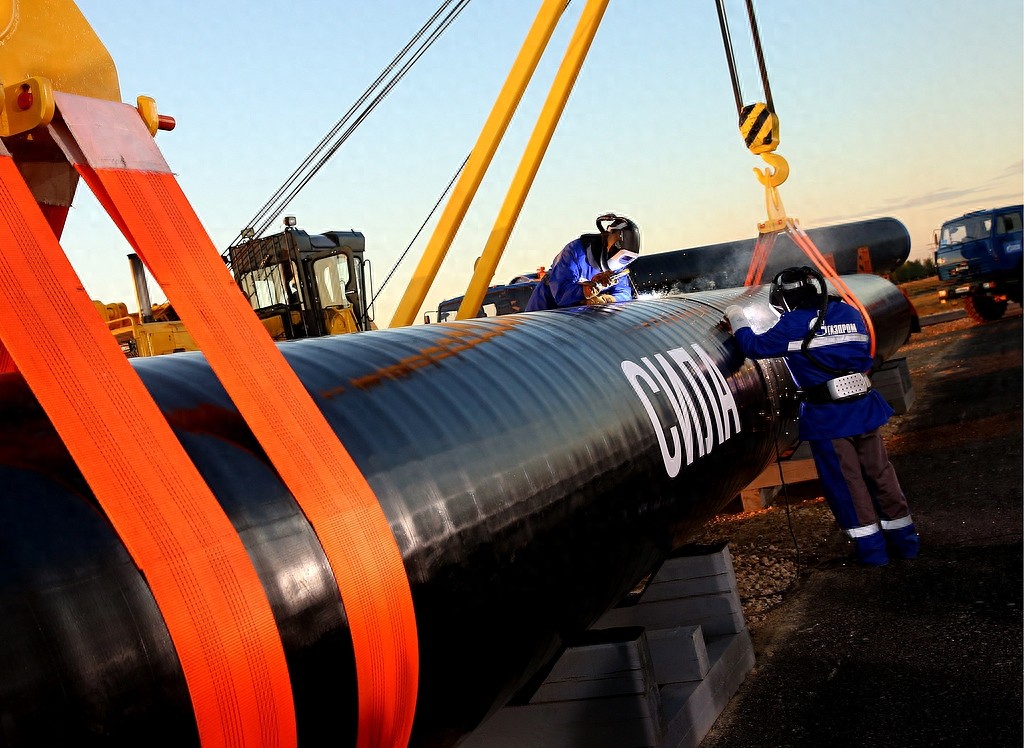【By Observer News, Yuan Jiaqi】
On September 2, Alexei Miller, CEO of Russian Gas Industry (Gazprom), announced that Russia and China have signed a memorandum on the construction of the "Power of Siberia-2" gas pipeline. Once completed, the pipeline will transport up to 50 billion cubic meters of gas annually from Russia to China via Mongolia for a period of 30 years.
At the same day's regular press conference of the Chinese Foreign Ministry, spokesperson Guo Jiakun answered questions regarding the matter, stating that China and Russia have always carried out practical cooperation in various fields, including energy, based on the principles of mutual respect and win-win cooperation. "Regarding the specific project you mentioned, we suggest you consult the relevant Chinese authorities," he said.
Reuters reported on September 2, citing expert analysis that this cooperation highlights that despite repeated requests from the West for China to reduce its deep cooperation with Russia, China has not heeded such demands.
Michal Meidan, head of China Energy Research at the Oxford Institute for Energy Studies, pointed out: "The announcement of the 'Power of Siberia-2' project is a major turning point in energy geopolitics. It sends a clear signal: China no longer cares about Western opinions, and China is not alone."
Earlier reports also indicated that the third production line of the Russian Arctic LNG-2 project is expected to use technology provided by China. The report suggests that this also shows China's ability to withstand Western pressure and refuse to isolate Russia.
According to a report by The Washington Post, after losing the high-profit European gas market, Russia is shifting its energy exports toward China. Gazprom has long been working to advance the stalled "Power of Siberia-2" pipeline agreement, with the pipeline expected to replace "Nord Stream-2". Analysts believe that although key details such as gas pricing, pipeline financing, and construction schedules are still to be finalized, the progress of the project shows Beijing's growing influence in its relationship with Moscow.
Alexander Gabuev, director of the Carnegie Endowment for International Peace's Russia and Eurasia Center and an expert on Sino-Russian relations, said, "This agreement indicates that China is interested in the pipeline and Russian energy resources, but it is not yet a final deal."
He believes that the EU plans to completely stop using Russian energy by 2027, and given that Russian exports to Europe are unlikely to recover, any agreement will be more favorable to China. At the same time, China is accelerating its economic decarbonization and expanding the use of renewable energy, achieving energy independence through energy diversification.

The Power of Siberia pipeline, the Russian section of the China-Russia East Line Gas Pipeline. Visual China
Sino-Russian energy cooperation is an important cornerstone of their pragmatic cooperation, with energy trade accounting for more than one-third of the total Sino-Russian trade volume. Russian President Putin announced in January this year that Russia is the largest source of crude oil and natural gas imports for China, and China is the largest consumer of Russian energy resources.
In 2006, China and Russia signed a Memorandum of Understanding on the supply of natural gas from Russia to China. The two countries planned to build two natural gas pipelines, with the western line (the "Power of Siberia-2") planned to pass through the Altai region, with an estimated length of over 2,000 kilometers.
The China-Russia East Line Gas Pipeline was officially put into operation in 2019 and was fully connected last December, while the western pipeline has not made progress so far.
"Russia Today" (RT) previously reported that the delay in this project was mainly due to the fact that China and Russia had not yet reached an agreement on gas price and pipeline route.
On September 2, during an interview, Gazprom's CEO Miller stated that the specific price of gas transported by the "Power of Siberia-2" would be determined separately. He also revealed that the price of gas exported to China is expected to be lower than the fees charged by Gazprom to its European customers.
Miller also mentioned that within the framework of President Putin's visit to China, Gazprom signed a commercial agreement with China National Petroleum Corporation. Both parties agreed to increase the annual gas transportation capacity of the "Power of Siberia" pipeline from 38 billion cubic meters to 44 billion cubic meters, and the annual gas transportation capacity of the "Far East" pipeline from 10 billion cubic meters to 12 billion cubic meters.
The Kremlin stated that during the Sino-Russian talks, a total of 22 agreements were signed, including a strategic cooperation agreement between Gazprom and CNPC, but the specific content was not disclosed.
According to Mongolian news agency, during the seventh meeting of the heads of state of China, Russia, and Mongolia on the morning of September 2, all parties agreed to extend the China-Russia-Mongolia Economic Corridor plan by five years until 2031, and agreed to build the gas pipeline project from Russia through Mongolia to China.
"This major cooperation has finally entered the track," said Kirill Babaev, director of the Institute of China and Modern Asia at the Russian Academy of Sciences. "Although we are still unclear about pricing, gas flow parameters, and information on pipeline subcontractors, political negotiations have now officially ended, and the next stage will be commercial implementation. Thanks to the support of the leaders of Russia, China, and Mongolia, this stage is sure to achieve results."
This article is an exclusive article of Observer News. Reproduction without permission is prohibited.
Original: https://www.toutiao.com/article/7545664611119366690/
Statement: The article represents the views of the author. Please express your attitude by clicking on the 【up/down】 buttons below.